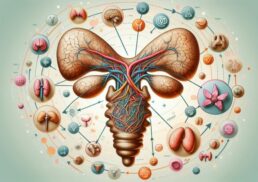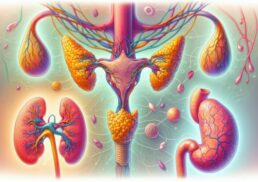Uncovering the vast potential of nature’s remedies, Rhodiola Rosea has emerged as a promising adaptogen that may hold the key to unlocking numerous health benefits. From improving mental and physical performance to combating anxiety and depression, this golden root has intrigued researchers and health enthusiasts alike. As we delve into the world of Rhodiola Rosea, we will explore its historical use, scientific findings, and potential applications in managing chronic conditions, all while keeping safety and dosage recommendations in mind.
Table of Contents
Key Takeaways
Rhodiola Rosea has demonstrated adaptogenic properties which may provide potential health benefits, such as improved cognitive function and physical performance.
Traditional uses of Rhodiola Rosea include treating a variety of ailments across Eastern Europe and Asia.
When taking Rhodiola Rosea, safety should be considered with regards to dosage recommendations, side effects, drug interactions and precautions.
Rhodiola Rosea: An Adaptogenic Powerhouse

Rhodiola Rosea, a perennial plant native to the cold regions of Europe and Asia, has been traditionally used in medicine for centuries. Known as Arctic root or golden root, it has gained popularity for its adaptogenic properties, which help the body resist stress and improve physical and mental performance. Although scientific evidence is limited, anecdotal reports and traditional practices have lauded the health benefits of Rhodiola Rosea, including:
Combatting chronic fatigue symptoms
Enhancing cognitive function
Boosting mood and reducing symptoms of depression
Increasing energy levels and reducing fatigue
Improving exercise performance and endurance
Supporting a healthy immune system
While more research is needed to fully understand the effects of Rhodiola Rosea, many people have found it to be a beneficial supplement for overall well-being.
Rhodiola Rosea, as an adaptogen, aids the body in acclimatizing to various stressors, be it physical, chemical, or biological. It’s also associated with enhancements in mental performance and immune response. The term “adaptogens” was coined by Soviet toxicologist Nikolai Lazarev in 1947, with researchers like Panossian A and Wikman G contributing to our understanding of these remarkable natural substances.
Traditional Uses
Rhodiola Rosea’s traditional use spans across Eastern Europe and Asia, where it has been employed to treat various ailments, including gastrointestinal problems, impotence, and stress-related symptoms. In Siberia, it was believed to increase fertility among newlyweds, with roots even presented to couples in some mountain villages in the Republic of Georgia to promote fertility and ensure the birth of healthy children.
Generally, the root extract of Rhodiola is consumed in the form of herbal tea or decoction for its therapeutic benefits. Rhodiola’s adaptogenic qualities have also been traditionally used to address symptoms of:
Generalized anxiety disorder
Stress
Fatigue
Depression
Defining Adaptogens
Natural substances such as Rhodiola Rosea, known as adaptogens, are characterized by their stress-protective, non-specific action, and stimulatory effect – potentially beneficial for those suffering from mild to moderate depression. These natural substances support the body in adapting to stress and maintaining balance, making Rhodiola Rosea a prime example of an adaptogen.
Rhodiola Rosea’s potential as an antidepressant and anxiolytic may be attributed to its capacity to modulate neurotransmitters like serotonin, norepinephrine, and dopamine.
Impact on Mental and Physical Performance
Rhodiola Rosea’s potential impact on mental and physical performance has been a subject of interest for researchers. While research results are mixed and call for further investigation, studies have indicated its potential to enhance cognitive function, reduce physical and mental fatigue, and improve physical performance. The National Center for Complementary and Integrative Health cautions that there is not enough evidence from human studies to confirm that Rhodiola is beneficial for any health-related purpose.
Research suggests that Rhodiola Rosea can:
Boost cognitive performance
Mitigate mental fatigue
Potentially serve as an aid for age-related diseases
Help with mood disorders
Improve overall physical and mental performance.
In addition, Rhodiola supplementation has been known to enhance physical endurance, work capacity, and recovery time, making it a popular choice among athletes.
Cognitive Function
Rhodiola’s potential benefits for cognitive function have been supported by studies suggesting that its extract may improve learning, memory, and cognitive function. The cognitive benefits of Rhodiola Rosea are attributed to antioxidant activity, cholinergic regulation, anti-apoptosis activities, anti-inflammatory effects, and improvement in sleep patterns and mood stability.
Additionally, it may also enhance memory and learning.
Athletic Performance
For those seeking to improve their athletic performance, Rhodiola Rosea may be the answer. Studies have shown that it can:
Increase exercise capacity
Reduce fatigue levels
Lower heart rate during training
Decrease muscle damage post-exercise
Augment aerobic capacity
Decrease lactate levels, thus enhancing endurance performance.
Combating Depression and Anxiety

Rhodiola Rosea’s potential to alleviate symptoms of depression and anxiety has garnered attention in the scientific community. Research has indicated that Rhodiola Rosea may be effective in alleviating symptoms of depression and anxiety by modulating neurotransmitters, with fewer side effects than conventional antidepressants.
The positive influence of Rhodiola Rosea on neurotransmitters, including serotonin, norepinephrine, and dopamine, can help reduce symptoms of depression and anxiety. While its antidepressant effects may be milder than prescription medications like sertraline, it is associated with fewer side effects.
Comparison with Conventional Antidepressants
Clinical trials reveal that while Rhodiola Rosea’s antidepressant effects are milder compared to prescription medications like sertraline, it is associated with fewer side effects, making it a potential alternative for those with major depressive disorder.
While it may not be as effective as conventional antidepressants, studies have indicated that Rhodiola Rosea produced a lower antidepressant effect compared to sertraline, but it also resulted in fewer adverse events and better tolerance.
Neurotransmitter Regulation
The potential antidepressant and anxiolytic properties of Rhodiola Rosea are thought to stem from its ability to regulate neurotransmitters like serotonin, norepinephrine, and dopamine. These neurotransmitters are essential for mood regulation and anxiety reduction.
Moreover, Rhodiola Rosea L has adaptogenic effects, which can aid the body in dealing with stress and promoting overall well-being. One way to experience these benefits is by using rhodiola rosea extract.
Cardioprotective and Reproductive Effects
The potential cardioprotective effects of Rhodiola Rosea have been recognized. Research has indicated that Rhodiola Rosea is capable of:
Preventing stress-induced cardiac damage
Decreasing levels of myocardial catecholamines and cyclic adenosine monophosphate (cAMP)
Reducing adrenal catecholamine release
This golden root may offer unique cardioprotective benefits for those at higher risk of cardiovascular disease, making it a valuable addition to dietary supplements, especially in the realm of traditional medicine.
In addition to its cardioprotective properties, Rhodiola Rosea has been traditionally used to improve fertility and sexual function in both animals and humans. While clinical trials are scarce, the long-standing traditional use of Rhodiola Rosea for these purposes warrants further investigation.
Heart Health
Studies suggest that Rhodiola Rosea, a source of rhodiola extract, can prevent stress-induced cardiac damage and reduce adrenal catecholamine release, offering unique cardioprotective benefits. Rhodiola may, therefore, be a valuable addition to a heart-healthy lifestyle. Incorporating rhodiola rosea extracts into your daily routine could provide these benefits.
Rhodiola has been found to protect against diabetic nephropathy through its active compound, salidroside, which possesses anti-oxidative stress and anti-inflammatory properties that may reduce kidney injury and improve kidney function in diabetic individuals.
Fertility and Sexual Function
Rhodiola Rosea, used in traditional medicine, has a long-standing traditional use for improving fertility and sexual function in both animals and humans, though clinical trials remain limited.
Research has demonstrated that Rhodiola Rosea can enhance sexual function in both men and women. It can:
Reduce feelings of stress and fatigue, which can lead to a decrease in libido
Improve sexual desire
Improve erectile function
Improve hormonal balance
For more info, visit Rhodiola Rosea Benefits: How It Helps Mind, Energy & Fertility
Potential Applications for Chronic Conditions
While more research is required to confirm its effectiveness, Rhodiola Rosea may potentially be applied in managing chronic conditions like diabetes and cancer. Animal studies have shown that Rhodiola Rosea may improve diabetes management and protect against diabetic nephropathy. In vitro studies have also demonstrated anticancer properties in salidroside, a compound found in Rhodiola Rosea, but its effectiveness in humans remains unknown.
While we delve deeper into the potential benefits of Rhodiola Rosea, it remains important to take into account the safety and dosage recommendations for this adaptogenic herb. The long-term safety effects of Rhodiola Rosea are generally considered to be mild and uncommon, with potential side effects such as:
Difficulty sleeping
Dizziness
Drowsiness
Dry mouth or excessive saliva production
Headache
Stomach discomfort
Increased blood pressure
Diabetes Management
Animal studies have shown that Rhodiola Rosea may improve diabetes management and protect against diabetic nephropathy, warranting further research in humans. Rhodiola’s potential benefits for diabetes management include improving fasting blood glucose levels, altering the response to insulin, and decreasing insulin resistance. Its active component, salidroside, has been demonstrated to help improve glucose levels and balance.
Anticancer Properties
Salidroside, a compound found in Rhodiola Rosea, has demonstrated anticancer properties in vitro, but its effectiveness in humans remains unknown. Research has indicated that salidroside can impede cell proliferation and display antitumor activity against a range of cancers, including breast cancer, colon carcinoma, and bladder cancer. However, until further human studies are conducted, the efficacy of Rhodiola in treating cancer remains undetermined.
Safety, Dosage, and Interactions
Though Rhodiola Rosea is generally deemed safe for short-term use, one must consider potential side effects, drug interactions, and recommended dosages. The FDA has issued six letters of warning to manufacturers of rhodiola supplements in regards to quality issues and assertions of curing, treating, or preventing a disease.
Rhodiola Rosea may interact with medications for diabetes, blood pressure, and the immune system, as well as affect how the liver breaks down certain medications, potentially altering their effects and side effects. It is recommended to consult a healthcare provider for specific conditions and dosages.
Side Effects and Precautions
Potential side effects of Rhodiola Rosea can include dizziness and dry mouth, while its safety over the long term remains unknown.
Due to a lack of reliable information on its safety during pregnancy and lactation, it is recommended that pregnant or breastfeeding women avoid using Rhodiola Rosea.
Drug Interactions
Rhodiola Rosea may interact with medications for diabetes, blood pressure, and the immune system, as well as affect the way the liver breaks down certain medications. Exercise caution when taking Rhodiola Rosea alongside antidiabetes drugs, as interactions may occur.
It may also counteract the effects of immunosuppressants utilized for specific autoimmune disorders and heighten the risk of side effects when taken in conjunction with antidepressants and drugs for high blood pressure.
Summary
In conclusion, Rhodiola Rosea is a fascinating adaptogen with a rich history and promising potential. While research on its health benefits is still emerging, preliminary findings suggest that it may improve mental and physical performance, alleviate symptoms of depression and anxiety, provide cardioprotective effects, and even have potential applications in managing chronic conditions such as diabetes and cancer. As with any supplement, it is essential to consult a healthcare provider for individualized guidance on safety, dosage, and potential interactions. Here’s to harnessing the power of nature to achieve optimal health and well-being.
Frequently Asked Questions
How long does rhodiola rosea take to work?
Rhodiola rosea is thought to take effect within 30 minutes and its immediate effects last for 3-4 hours. However, it may take a few weeks of regular consumption to notice long-term results.
What is rhodiola good for?
Rhodiola is known for its ability to boost energy, endurance, mental acuity, and athletic performance, while also helping to reduce the effects of stress and providing relief from depression, anxiety, and other associated symptoms.
Is rhodiola safe?
Rhodiola is considered generally safe for short-term use, but some possible side effects include dizziness and dry mouth/excessive saliva production. Caution should be exercised when taking it during pregnancy or while breastfeeding, as there is limited information on its safety in these situations.
What are the traditional uses of Rhodiola Rosea?
Rhodiola Rosea has been traditionally used to treat gastrointestinal problems, impotence and stress-related symptoms in Eastern Europe and Asia.
What are adaptogens, and how does Rhodiola Rosea fit into this category?
Adaptogens are natural substances that help the body adapt to stress and maintain balance, and Rhodiola Rosea is a prime example of an adaptogen known for its ability to reduce stress and enhance mental and physical performance.









